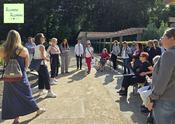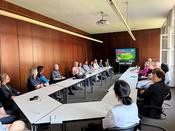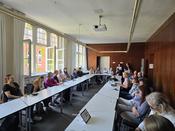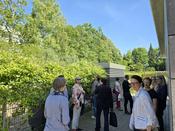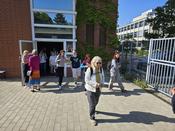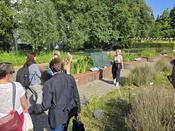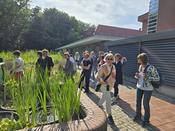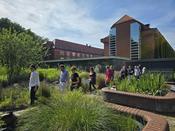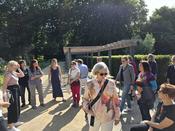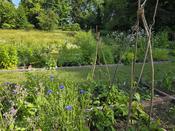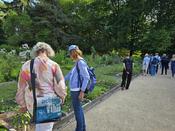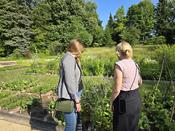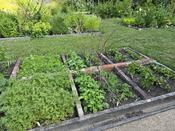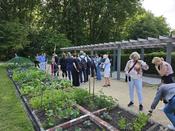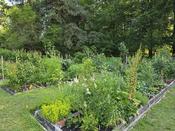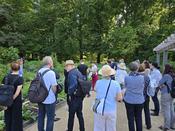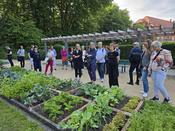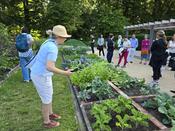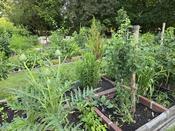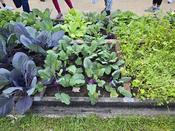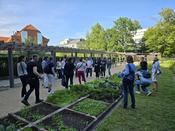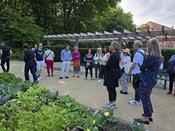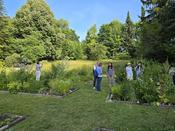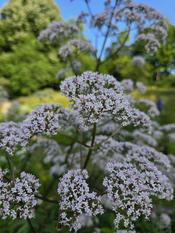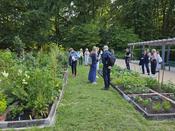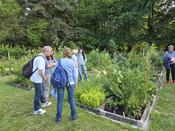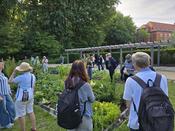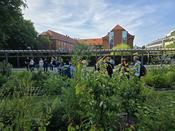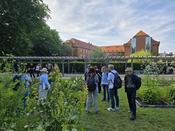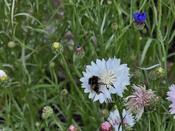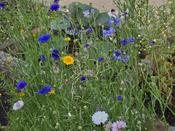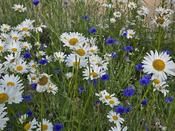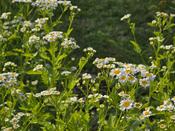Von Alumni für Alumni: Visit to the Botanic Garden
Von Alumni für Alumni: Visit to the Botanic Garden
Exciting insights into the work of the Botanic Garden, rounded off with a guided tour of the crop garden - on July 13th, 2025 we visited alumna Luiza Bengtsson. She has been Head of the Botanic Garden's Museum and Society department since 2024. The Botanic Garden with its associated museum is a collection institution - guided by the mission “explain, preserve, explore”, the aim here is to understand biological diversity. In addition to the living collection of 20,000 plant species, including a cactus over 300 years old, the collection also includes an extensive herbarium, which provides information on how biological diversity has developed and what grew where and when.
The Dahlem seedbank contains wild plants and endangered species from Berlin and Brandenburg. The DNA bank contains 50,000 DNA and tissue samples from plants, fungi, algae and lichens. The museum's history of science collection, which will reopen after 2027, houses archives and objects from the past. One of these objects is currently on display at the Egyptian Museum, while another will be loaned to Deutsches Historisches Museum in the fall. The Botanic Garden's publicly accessible library is the largest library for botany in Germany; it was founded in 1819.
The Botanic Garden with its almost 350-year tradition also sees itself as a data and competence center, for example, biodiversity software is also developed and there are many research projects. For example, bluebells are being studied and how they evolve in response to changing conditions. Research is also being carried out on diatoms, of which researchers estimate there are over 100,000 species. They are essential for life on Earth - diatoms produce 25 % of the world's oxygen. They come in a wide variety of forms and are found not only in water but also in soil. New species are discovered every day, 50 of which have been discovered at the Botanic Garden.
The Botanic Garden also cooperates with the Ethnological Museum and the Museum of Natural History throughout Berlin. The Botanic Garden is also well connected internationally and is active in various networks, including many links to the Global South, where the biodiversity hotspots can be found.
The Science and Society department, which Luiza Bengtsson leads, pursues the goal of bringing botanical research into society. This involves the interaction of science and society, including educational programs for children and adults, events such as the annual Biodiversity Day on 22 May, workshops, guided tours, lectures and consultations.
In some projects, research is carried out together with citizens. One example is the citizen science project “The Herbonauts” - the aim here is to decipher old labels with handwritten entries by, for example, Alexander von Humboldt and other botanists and researchers. If you prefer something more digital and up-to-date, you can use the iNaturalist app, an open-source project from the world of science, to help discover new species.
The botanical advice center, for example, advises on species-appropriate urban greening with regional seeds. The mushroom advisory service at the Botanic Garden has been around for 130 years. School groups are also frequent visitors to the Botanic Garden. It is Luiza Bengtsson's wish that every pupil in Berlin visits the Botanic Garden at least once during their school career.
The alumni group was delighted with the many insights - into the projects, into the research, into rooms with stacked herbaria and finally the summer freshness of the crop garden with ripening vegetables, berries and flowers. The subjects studied by the alumni themselves were just as diverse: from Egyptology, Biology, Geosciences, Ethnology, Political Science, Scandinavian Studies, Mathematics, Medicine, Meteorology, Sociology and Psychology, Musicology to Law, Information Sciences, Business Administration and Economics, numerous disciplines of the FU were represented. In further exchanges, the alumni discovered common topics, geologists from different years came together, the biologists talked shop about the names of various plants, one alumna spoke Swedish with Luiza Bengtsson and the first possibilities for cooperation were considered.
One alumna is celebrating the 20th anniversary of her wedding this year, which took place in the Botanic Garden's Mediterranean House. Unfortunately, this is no longer possible as the Berlin Senate's budget cuts are presenting the Botanic Garden with challenges. In addition to volunteering, other ways to support the garden include sponsoring plants or buying an annual pass.
Are you an alumna or alumnus of Freie Universität and would like to present your place of work? We look forward to receiving your e-mail!

